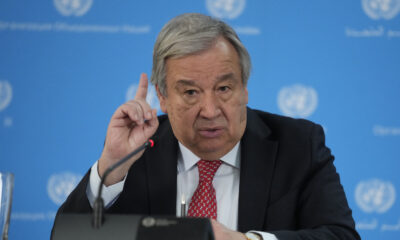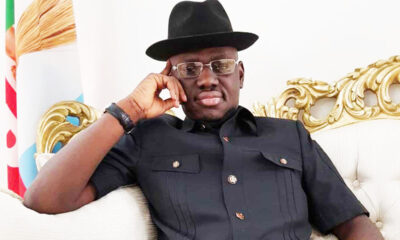Opinion
Farooq Kperogi: What Trump’s comeback may mean for Africa

Farooq Kperogi: What Trump’s comeback may mean for Africa
A few weeks ago, I spoke at a symposium in my university here in Georgia on the implications of the U.S. presidential election for the African diaspora. To the bemusement of my audience (who were a mix of Donald Trump and Kamala Harris supporters), I explained the curious phenomenon of African support for Donald Trump, particularly among Nigerian and Kenyan evangelicals.
I described how a surprising number of African Christians (and, in fact, some Muslims) consider Trump “God’s chosen one,” a valiant defender of conservative religious values whom they imagine will take on global LGBTQ rights with righteous vengeance.
The audience was incredulous and struggled to reconcile Trump’s infamous moral transgressions with his appeal to African conservatives. When I explained that these supporters see Trump as a warrior against the “cultural liberalism” they believe threatens their faith, eyebrows raised.
The eyebrows raised even further when I pointed out that there are Muslims who are so disillusioned with the Biden/Harris administration’s support for Israel that they prayed for a Trump win even when Trump is more manifestly hawkish than Biden/Harris and so disdains Muslims that he enacted a “Muslim ban” (which actually included non-Muslims) within the first few months of his first presidency.
But here’s the crux: Donald Trump is no more interested in religious morality than he is in the theological reveries of his African fan base. He is, in truth, a transactional man, a walking paradox of deals and calculations, utterly bereft of the very spiritual or moral foundation his African supporters so naively project onto him.
Trump’s “faith,” such as it is, is at best a performance, an asset to be deployed for strategic gains among America’s own conservative Christians, whom he has calculatedly courted for votes. To imagine Trump as the champion of conservative religious values is to mistake calculation for conviction and propaganda for principle.
His record speaks louder than his rhetoric. In 2015, for example, at a gathering of conservative Christians in Iowa, he openly admitted he never asks God for forgiveness, a theological anathema for any believer.
Later, on the campaign trail, he betrayed his biblical unfamiliarity, when he clumsily referred to “Two Corinthians” rather than the more common “Second Corinthians.” A slip of the tongue, perhaps, but in a subsequent interview, he tried to salvage his Christian credibility but ended up quoting a verse that doesn’t even exist: “Never bend to envy,” he offered, an adage Christians say is found nowhere in the Bible.
READ ALSO:
- Nigerian pastor under fire for congratulating Trump
- Tinubu’s choice of my replacement wrong, says ex-housing minister
- Germany relaxes EU Blue Card rules to attract skilled workers
Even when cornered about his favorite Bible verse, he misfired by citing “an eye for an eye,” a command Jesus explicitly repudiated. These are not the errors of a deeply religious man but the floundering of someone who considers faith a tool, not a calling.
Two Trump biographers sum up his attitude to Christianity and God nicely. Timothy O’Brien, in a 2007 book titled TrumpNation: The Art of Being Donald, wrote: “Donald has never been a spiritually or religiously serious person.”
And in 2001 book titled The Trumps: Three Generations That Built an Empire (which was revised and reissued as The Trumps: Three Generations of Builders and a President), Gwenda Blair wrote: “He’s a transactional guy with humans, and it’s no different with God — it’s all about whatever is to his advantage with regard to his supporters, and referencing God is exactly and only that.”
Yet for all his transparent artifice, Trump has nonetheless cast a beguiling spell on certain parts of Africa and the African diaspora, who see in him a savior of conservative values. They seem unfazed by the fact that his administration’s policies, his rhetoric, and his track record show little regard for Black humanity.
This disdain was palpable during his last tenure, and his recent rallies have done nothing to dispel it. Take, for instance, his unfounded claim during the first and only presidential debate that Black Haitian immigrants in Springfield, Ohio, were eating cats and dogs, a baseless assertion that isn’t just false but revelatory: it reveals a mind committed to degrading Blackness wherever he sees it.
There’s a dark and disheartening history here. Trump’s disdain for Black people isn’t new, nor has it emerged from thin air. His bigotry is old news, woven through an embroidery of disparaging comments, discriminatory practices, and racially motivated policies dating back decades.
In 1973, the Department of Justice sued Trump for refusing to rent apartments to Black families, citing his blatant violation of the Fair Housing Act. He fought the case before reluctantly signing an agreement to stop his racist practices.
His remarks afterward? He railed that the government was forcing him to rent to “welfare recipients,” the vile code by which he aligned poverty with Blackness. The sentiment was clear: in his mind, Black people didn’t belong, and it was his duty to keep them out.
Such is Trump’s enduring perspective, made all the more alarming by his political ascendance. The implications of his return for Africa are both direct and symbolic. During his previous presidency, Trump cut aid programs that many African countries rely on and dismissed African immigrants as a detriment to American society.
His rhetoric went beyond mere words; his policies made a statement, a policy posture that informed his supporters, shaped the broader narrative around Black immigration, and foreshadowed his now-infamous “shithole countries” comment in 2018.
When Trump disparaged Haiti, Nigeria, and other Black-majority nations in favor of immigration from Norway, it wasn’t just a one-off gaffe; it was a worldview rooted in negrophobic disdain.
In truth, Trump has never reckoned with the humanity of Black people. Even before his “shithole countries” remark, he lambasted a Black accountant in 1991, citing “laziness as a trait in Blacks.”
Years later, during his 2016 campaign, he praised Ann Coulter’s venomously xenophobic book, which decried the arrival of Nigerians in the United States as a criminal invasion.
READ ALSO:
- Baltasar Engonga: I dated him for four years, lady says, sues for betrayal
- Biden, Trump set for rare direct encounter at White House this week
- Why I married my husband – Mercy Aigbe
His decision to block the appointment of Ngozi Okonjo-Iweala, a Nigerian-American, to lead the World Trade Organization in 2020, was yet another evidence of his disregard for Black excellence—American citizenship or no.
This is not a man whose opinions have been shaped by reasoned disagreement but by ingrained prejudice and an unwavering belief that Black lives, both within and outside of America, are lesser. Such a man at the helm of one of the world’s most powerful nations isn’t just a potential diplomatic nightmare; it’s a moral catastrophe for those who value the dignity of human life.
For Africa, the implications of a Trump resurgence are manifold. His approach to immigration alone could lead to increased restrictions on Africans seeking opportunity or refuge in the United States.
His contempt for Africans doesn’t only taint those who seek to immigrate but extends to those who remain. His willingness to denigrate entire nations with his vile language reinforces a global view of Africa as “the other,” a place he deemed too backward to deserve respect or dignify.
But Trump’s leadership affects more than just immigration. His previous administration gutted health programs that African nations relied on to tackle AIDS, malaria, and other epidemics. His withdrawal from multilateral agreements and climate initiatives destabilized African countries that disproportionately suffer from the effects of global warming and benefit the least from its economic causes.
Africa is neither immune to nor shielded from Trump’s reign. From economic pressures to ideological disrespect, his contempt manifests as policies that undermine progress and sow the seeds of isolationism.
For Africans, Trump’s victory isn’t just a foreign policy issue; it’s a personal affront. It’s a slap in the face to the millions of Africans who know America as a country that historically symbolized freedom, opportunity, and hope.
Africa’s bond with the United States transcends politics; it is the memory of independence movements supported by the promise of democracy, the aspiration for economic opportunity, and the reverence for cultural exchange. Trump’s worldview, with its utter disregard for Black humanity, threatens to erode this bond, leaving in its wake a continent left to question its ties with the West.
The challenge before Africa is to use this moment as an opportunity for unity and self-determination.
Trump’s contempt is an ugly mirror, a stark reminder that Africa cannot rely on foreign validation. Leaders and citizens alike must demand dignity, both in their interactions with the United States and in their own national narratives.
The message should be clear: Africa is neither a pawn nor a supplicant. It is a continent rich in resources, diversity, and human potential, undeserving of the scorn Trump so freely dispenses.
Trump’s victory may symbolize a return to darkness, but it is also an opportunity to galvanize resilience. Africa need not waste energy on a man who cannot see beyond his prejudice; instead, it should look to the future with resolve.
Africa’s destiny lies not in the hands of a foreign leader, and certainly not in one so blind to its humanity. Let his disdain be a rallying cry, not for despair, but for Africa to rise on its own terms.
Farooq Kperogi: What Trump’s comeback may mean for Africa
Farooq Kperogi is a renowned Nigerian columnist and United States-based Professor of Media Studies.
Opinion
El Rufai’s Arise News mind game with Ribadu, By Farooq Kperogi

El Rufai’s Arise News mind game with Ribadu, By Farooq Kperogi
El Rufai’s Arise News mind game with Ribadu, By Farooq Kperogi
Opinion
Oshiomhole: Behold the 13th disciple of Christ

Oshiomhole: Behold the 13th disciple of Christ
Opinion
AFCON 2025: Flipping Content Creation From Coverage to Strategy

AFCON 2025: Flipping Content Creation From Coverage to Strategy
By Toluwalope Shodunke
The beautiful and enchanting butterfly called the Africa Cup of Nations (AFCON) emerged from its chrysalis in Khartoum, Sudan, under the presidency of Abdelaziz Abdallah Salem, an Egyptian, with three countries—Egypt, Sudan, and Ethiopia—participating, and Egypt emerging as the eventual winner.
The reason for this limited participation is not far-fetched. At the time, only nine African countries were independent. The remaining 45 countries that now make up CAF’s 54 member nations were either pushing Queen Elizabeth’s dogsled made unique with the Union Jack, making supplications at the Eiffel Tower, or knocking at the doors of the Palácio de Belém, the Quirinal Palace, and the Royal Palace of Brussels—seeking the mercies of their colonial masters who, without regard for cultures, sub-cultures, or primordial affinities, divided Africa among the colonial gods.
From then until now, CAF has had seven presidents, including Patrice Motsepe, who was elected as the seventh president in 2021. With more countries gaining independence and under various CAF leaderships, AFCON has undergone several reforms—transforming from a “backyard event” involving only three nations into competitions featuring 8, 16, and now 24 teams. It has evolved into a global spectacle consumed by millions worldwide.
Looking back, I can trace my personal connection to AFCON to table soccer, which I played alone on concrete in our balcony at Olafimihan Street—between Mushin and Ilasamaja—adjacent to Alafia Oluwa Primary School, close to Alfa Nda and Akanro Street, all in Lagos State.
Zygmunt Bauman, the Polish-British sociologist who developed the concept of “liquid modernity,” argues that the world is in constant flux rather than static, among other themes in his revelatory works.
For the benefit of Millennials (Generation Y) and Generation Z—who are accustomed to high-tech pads, iPhones, AI technologies, and chat boxes—table soccer is a replica of football played with bottle corks (often from carbonated drinks or beer) as players, cassette hubs as the ball, and “Bic” biro covers for engagement. The game can be played by two people, each controlling eleven players.
I, however, enjoyed playing alone in a secluded area, running my own commentary like the great Ernest Okonkwo, Yinka Craig, and Fabio Lanipekun, who are all late. At the time, I knew next to nothing about the Africa Cup of Nations. Yet, I named my cork players after Nigerian legends such as Segun Odegbami, Godwin Odiye, Aloysius Atuegbu, Tunji Banjo, Muda Lawal, Felix Owolabi, and Adokiye Amiesimaka, among others, as I must have taken to heart their names from commentary and utterances of my uncles resulting from sporadic and wild celebrations of Nigeria winning the Cup of Nations on home soil for the first time.
While my connection to AFCON remained somewhat ephemeral until Libya 1982, my AFCON anecdotes became deeply rooted in Abidjan 1984, where Cameroon defeated Nigeria 3–1. The name Théophile Abéga was etched into my youthful memory.
Even as I write this, I remember the silence that enveloped our compound after the final whistle.
It felt similar to how Ukrainians experienced the Battle of Mariupol against Russia—where resolute resistance eventually succumbed to overwhelming force.
The Indomitable Lions were better and superior in every aspect. The lion not only caged the Eagles, they cooked pepper soup with the Green Eagles.
In Maroc ’88, I again tasted defeat with the Green Eagles (now Super Eagles), coached by the German Manfred Höner. Players like Henry Nwosu, Stephen Keshi, Sunday Eboigbe, Bright Omolara, Rashidi Yekini, Austin Eguavoen, Peter Rufai, Folorunsho Okenla, Ademola Adeshina, Yisa Sofoluwe, and others featured prominently. A beautiful goal by Henry Nwosu—then a diminutive ACB Lagos player—was controversially disallowed.
This sparked outrage among Nigerians, many of whom believed the referee acted under the influence of Issa Hayatou, the Cameroonian who served as CAF president from 1988 to 2017.
This stroll down memory lane illustrates that controversy and allegations of biased officiating have long been part of AFCON’s history.
The 2025 Africa Cup of Nations in Morocco, held from December 21, 2025, to January 18, 2026, will be discussed for a long time by football historians, raconteurs, and aficionados—for both positive and negative reasons.
These include Morocco’s world-class facilities, the ravenous hunger of ball boys and players (superstars included) for the towels of opposing goalkeepers—popularly dubbed TowelGate—allegations of biased officiating, strained relations among Arab African nations (Egypt, Algeria, Tunisia, and Morocco), CAF President Patrice Motsepe’s curt “keep quiet” response to veteran journalist Osasu Obayiuwana regarding the proposed four-year AFCON cycle post-2028, and the “Oga Patapata” incident, where Senegalese players walked off the pitch after a legitimate goal was chalked off and a penalty awarded against them by DR Congo referee Jean-Jacques Ndala.
While these narratives dominated global discourse, another critical issue—less prominent but equally important—emerged within Nigeria’s media and content-creation landscape.
Following Nigeria’s qualification from the group stage, the Super Eagles were scheduled to face Mozambique in the Round of 16. Between January 1 and January 3, Coach Eric Chelle instituted closed-door training sessions, denying journalists and content creators access, with media interaction limited to pre-match press conferences.
According to Chelle, the knockout stage demanded “maximum concentration,” and privacy was necessary to protect players from distractions.
This decision sparked mixed reactions on social media.
Twitter user @QualityQuadry wrote:
“What Eric Chelle is doing to journalists is bad.
Journalists were subjected to a media parley under cold weather in an open field for the first time in Super Eagles history.
Journalists were beaten by rain because Chelle doesn’t want journalists around the camp.
Locking down training sessions for three days is unprofessional.
I wish him well against Mozambique.”
Another user, @PoojaMedia, stated:
“Again, Eric Chelle has closed the Super Eagles’ training today.
That means journalists in Morocco won’t have access to the team for three straight days ahead of the Round of 16.
This is serious and sad for journalists who spent millions to get content around the team.
We move.”
Conversely, @sportsdokitor wrote:
“I’m not Eric Chelle’s biggest supporter, but on this issue, I support him 110%.
There’s a time to speak and a time to train.
Let the boys focus on why they’re in Morocco—they’re not here for your content creation.”
From these three tweets, one can see accessibility being clothed in beautiful garments. Two of the tweets suggest that there is only one way to get to the zenith of Mount Kilimanjaro, when indeed there are many routes—if we think within the box, not outside the box as we’ve not exhausted the content inside the box.
In the past, when the economy was buoyant, media organisations sponsored reporters to cover the World Cup, Olympics, Commonwealth Games, and other international competitions.
Today, with financial pressures mounting, many journalists and content creators seek collaborations and sponsorships from corporations and tech startups to cover sporting events, who in turn get awareness, brand visibility, and other intangibles.
As Gary Vaynerchuk famously said, “Every company is a media company.” Yet most creators covering AFCON 2025 followed the same playbook.
At AFCON 2025, most Nigerian journalists and content creators pitched similar offerings: on-the-ground coverage, press conferences, team updates, behind-the-scenes footage, analysis, cuisine, fan interactions, and Moroccan cultural experiences.
If they were not interviewing Victor Osimhen, they were showcasing the stand-up comedy talents of Samuel Chukwueze and other forms of entertainment.
What was missing was differentiation. No clear Unique Selling Proposition (USP). The result was generic, repetitive content with little strategic distinction. Everyone appeared to be deploying the same “Jab, Jab, Jab, Hook” formula—throwing multiple jabs of access-driven content in the hope that one hook would land.
The lesson is simple: when everyone is jabbing the same way, the hook becomes predictable and loses its power.
As J. P. Clark wrote in the poem “The Casualties”, “We are all casualties,” casualties of sameness—content without differentiation. The audience consumes shallow content, sponsors lose return on investment, and creators return home bearing the “weight of paper” from disappointed benefactors.
On November 23, 1963, a shining light was dimmed in America when President John F. Kennedy was assassinated.
As with AFCON today, media organisations sent their best hands to cover the funeral, as the who’s who of the planet—and if possible, the stratosphere—would attend. Unconfirmed reports suggested that over 220 VVIPs were expected.
While every newspaper, radio, and television station covered the spectacle and grandeur of the event, one man, Jimmy Breslin, swam against the tide. He chose instead to interview Clifton Pollard, the foreman of gravediggers at Arlington National Cemetery—the man who dug John F. Kennedy’s grave.
This act of upended thinking differentiated Jimmy Breslin from the odds and sods, and he went on to win the Pulitzer Prize in 1986.
Until journalists and content creators stop following the motley and begin swimming against the tide, access will continue to be treated as king—when in reality, differentiation, aided by strategy, is king.
When every journalist and content creator is using Gary Vaynerchuk’s “Jab, Jab, Jab, Hook” template while covering major sporting events, thinkers among them must learn to replace one jab with a counterpunch—and a bit of head movement—to stay ahead of the herd.
Toluwalope Shodunke can be reached via tolushodunke@yahoo.com
-

 metro3 days ago
metro3 days agoIKEDC Sets Feb 20 Deadline for Customers to Submit Valid IDs or Face Disconnection
-

 Education3 days ago
Education3 days agoSupreme Court Affirms Muslim Students’ Right to Worship at Rivers State University
-

 News2 days ago
News2 days agoAso Rock Goes Solar as Tinubu Orders National Grid Disconnection
-

 metro2 days ago
metro2 days agoLagos Police Launch Manhunt for Suspect in Brutal Ajah Murder
-

 Business3 days ago
Business3 days agoNaira Could Trade Below ₦1,000/$ With Dangote Refinery at Full Capacity — Otedola
-

 International3 days ago
International3 days agoTrump Halts Minnesota Immigration Crackdown After Fatal Shootings, Protests
-

 metro3 days ago
metro3 days agoArmy University Professor Dies in Boko Haram Captivity After Nearly One Year
-

 Sports2 days ago
Sports2 days agoLookman Shines as Atlético Madrid Hammer Barcelona 4-0













